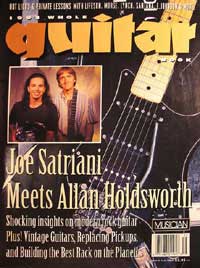Dual-ing Guitars
By Alex Lifeson, 1993 Whole Guitar Book Musician Magazine Special, "Private Lessons" Section, transcribed by Ethan Prater

Because of the constraints of the three-piece, I always felt that the guitar had to be more than a solo insrument; it had to be more rhythmic and capable of developing a melody completely. There's been a lot of freedom in Rush to experiment and to cultivate a fairly broad style, and it was always important to refine the chord voicings so that the guitar took up a lot of space and sounded full. Of course, when we added keyboards, they took up a lot of slack, but I think the use of these sorts of chords to get more width out of the guitar stylistically, I've always been an effects-type guitar player. I've tried to stay on top of effects as they've come along over the years, from the very first MXR phasers right through the modern stuff, and that plays an important part in developing textures. So it's really the combination of those kind of voicings with the technology that's available.
To use "Distant Early Warning" as an example, Geddy Lee basically pedals through that in A. I tried to incorporate most of the melody he's playing in the structure of the chord just to get it as broad as I can. I play the basic chord, but I add the seventh:
X O X X
================ ================
|__|__|__X__|__X |__X__|__|__X__|
|__|__|__|__|__| |__|__|__|__|__|
|__|__X__|__|__| |__|__X__X__|__|
|__|__|__|__X__| |__|__|__|__|__|
|__|__|__|__|__| |__|__|__|__|__|
It sounded right in the line he was playing; it just filled that whole space and sounded broader than a standard chord. You can move the chord structure at right, A C with an added D, up to the tenth fret to get to G with an added A.
I started playing with chords like that around the time the Boss chorus came out; I found that the jangliness of the chorus really accentuated those kind of chords and the broadness of the sound almost made it sound like there were two guitars playing. And that's really what it comes down to with my voicings: I try to make it sound like it is two guitars rather than one.
This is going back 15 years, but a lot of the chords in the piece "Hemispheres" were played with the open B and high E strings droning. It opens up with an F# but with those two strings ringing out, and goes up with that same major idea - with the two open strings - to the A at the fifth fret, and continues throughout. I play all the chords keeping those notes open, whether it's a B at the seventh or the second fret, again for that reason of giving it width and size. Instead of playing, say, a regular B major, I'd play a chord with the same sort of structure as in "Distant Early Warning," but with those two strings open.
O O X O O ================ ================ |__|__|__|__|__| |__|__|__|__|__| X__|__|__|__|__| |__X__|__|__|__| |__|__|__X__|__| |__|__|__|__|__| |__X__X__|__|__| |__|__X__X__|__| |__|__|__|__|__| |__|__|__|__|__|
Play along with records you like, learn the parts and get a sense of what the players are doing in terms of songwriting and structure; develop an understanding of it from that point and then translate it to whatever that person does with people he plays with. I've been lucky in that the rhythm section in the band I work with is pretty hot; Neil Peart and Geddy are really in tune with each other, and a lot of times it's uncanny - they'll be jamming along and just click in on all these little nuances. It's very, very solid yet interesting and quit experimental, so the guitar can play over it until it locks into what's going on from a rhythmic standpoint. In the early days I wasn't really sensitive to what Neil's bass pedal was doing, or the little things on the hi-hat. I tried to lock in on that, and it's been a great benefit. It also made things harder to play, which was a very important consideration for us back then; we always wanted to push ourselves.
I hear inspiring guitarists constantly - Eric Johnson's Ah Via Musicom was a spectacular album. We were lucky enough to have Eric open for us for a month, and I was up there every night watching him play; he's absolutely my favorite guitarist, and he's a positive, good person. Steve Morse, same thing. Those guys I put in a completely other category: They are truly guitarists, and they are brilliant. These guys know everything. But everyone's different, and that's really important for guitarists to remember. You shouldn't gauge your abilities against somebody like that; you should strive to learn the things they know, but always maintain the self-confidence that what you're doing is the best you can do at any given time.